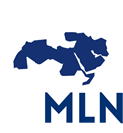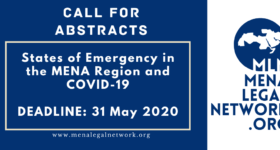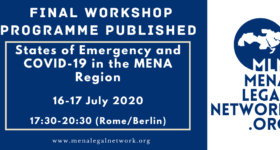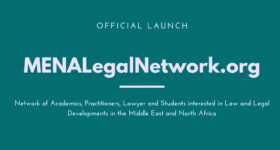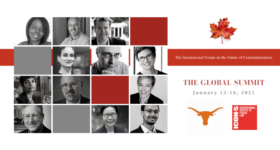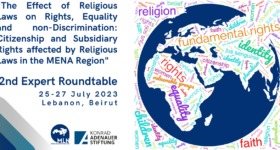MENALegalNetwork.org hosts expert panel on ‘States of Emergency in the MENA Region, at The Global Summit
The MENALegalNetwork.org hosted an Expert Panel on ‘States of Emergency in the MENA Region: Challenges, Trends and Perspectives‘ at The Global Summit**, organised by the International Forum on the Future of Constitutionalism on 14 January, 2021.
Join us next week at “The Global Summit,” a 5-day celebration of democracy, rights, and the rule of law, featuring 400+ speakers, 100+ panels, and 6 official languages. Free and open to all.
My friend and colleague Catarina Santos Botelho tells you about the program in this short video. Have a look!
And then check out the conference webpage to sign up for any or all of the 100 panels that interest you.
More details here: https://law.utexas.edu/the-global-summit.
Posted by The International Forum on the Future of Constitutionalism on Thursday, January 7, 2021
The expert panel on States of Emergency in the MENA Region was chaired by Prof. Francesco Biagi (University of Bologna) and papers were presented by Dr. Sanaa Alsarghali (An-Najah University) on ‘Semi-presidential System in Times of Emergency: The Case of Palestine’, Dr.Tamara El Khoury (IE University) on ‘Consociationalism and States of Emergency: The Case of Lebanon’, Mr. Siraj Khan, LL.M., (Max Planck Foundation for International Peace and the Rule of Law) on ‘States of Emergency and the Shari’a: Harm and Necessity in Constitutional Law and Islamic Law’, and Mr. Islam Mohammed (Central European University) on ‘The Role of the Supreme Constitutional Court of Egypt (SCCE) Under the Emergency Challenge’.
The full papers will be available in an edited volume currently in preparation for publication. Abstracts of the papers delivered at the Global Summit are provided below:
Sanaa Alsarghali: Semi-presidential System in Times of Emergency: The Case of Palestine
There is a tendency for semi-presidential systems to cause a political deadlock between the three key players in its system: the President, the Legislature and the Prime Minister and is especially true in politically unstable countries that lack political maturity. Palestine is an emblematic case in this regard after the semi-presidential system was imposed by the international community in 2003 and caused ambiguity in the roles of president and prime minister. Indeed, the consequent instabilities were compounded after the 2005 elections and the new prime minister elected had a different party affiliation to the president. The resulting conflict split the Palestinian territory into two, the West-Bank and Gaza. Palestine has since entered a period of limbo, with no sitting legislative council and a president who is routinely forced to invoke the emergency and necessity provisions of the Basic Law (BL) in order to keep the government functioning. As such, this presentation argues that the way semi-presidential system was applied in Palestine (especially with how the powers were divided between the president and the prime minister) will always lead to different forms of political deadlock.
Tamara El Khoury: Consociationalism and States of Emergency: The Case of Lebanon
When Lebanon first declared general mobilization in March 2020 to address the COVID-19 pandemic, the country was already at the brink of financial collapse. Months of widespread, cross-sectarian popular mobilizations against the ruling elites came to a halt as citizens were asked to stay at home. On 4 August, a massive explosion rocked Beirut, leading the authorities to declare a state of emergency for the first time since 1973. Unlike general mobilization, which merely requires its declaration by a decree of the Council of Ministers on the basis of a two-third majority of its members, the declaration of a state of emergency further requires approval by Parliament within an eight-day period. However, a state of emergency can be renewed, and there is no maximum period of time it can be in effect. More importantly, it gives the Lebanese Army sweeping powers, including the authority to enforce home searches at any time, issue house arrests, ban gatherings that are deemed security threats, impose curfews, and even censor the media. While Lebanon has historically escaped the regional proclivity toward quasi-permanent states of emergency, increasing surveillance and clampdowns, including on members of the press, beg the question of whether the state of emergency and general mobilization are not being resorted to by an ailing regime to provide much-needed legal cover to quell popular demands for its replacement. More generally, the current situation offers an opportunity to explore how states of emergency play out in (dysfunctional) consociational systems, and whether they serve to contain or exacerbate their flaws.
Siraj Khan, LL.M: States of Emergency and the Shari’a: Harm and Necessity in Constitutional Law and Islamic Law
Governments and executive bodies in Muslim-majority states must comply with constitutional and legal requirements when exercising emergency powers. At the same time they must continue to provide citizens with the rights and freedoms necessary in a democratic society. This has proven to be challenging, even for liberal and secular democracies, for whom fundamental rights and freedoms form the cornerstone. So what of states that subscribe to an official religion or in which state authorities, courts and quasi-state institutions have a legal mandate to manage and protect the religious affairs and rights of their citizens and adherents? Many Muslim-majority states demand and impose varying degrees of adherence to Islamic law, while at least formally acknowledging fundamental rights that prevent against coercion, thereby permitting exceptions under duress, emergency and necessity. Shari’a courts, fatwa- and clerical bodies (‘Ulama councils) have suffered instability in many Muslim-majority states, recently showing a slow and gradual resurgence and an increased involvement in affairs of state, holding the executive to account for the validity of their measures according to the law and to the Shari’a. From this perspective, this paper explores the extent to which emergency situations in Muslim majority states permit derogation from the ordinary constitutional, legal and religious strictures under constitutional law and Islamic law. Comparisons will be drawn between the roles of government, leaders and citizens, and the concepts of the ‘prevention of harm’ and ‘necessity’ (as exceptions by which fundamental rights and freedoms can be restricted) in constitutional law and Islamic law.
Islam Mohammed: The Role of the Supreme Constitutional Court of Egypt (SCCE) Under the Emergency Challenge
A state of emergency imposes foundational challenge to constitutional courts: whether the emergency measures cannot be bound by the normative principles of constitutionalism (Locke’s view), or if the emergency is limited by the principles of constitutionalism (Kant’s account). My presentation outlines how the SCCE perceives its role under this emergency challenge. To investigate such role, I discuss the design of the SCCE and its main features. Further, I examine the doctrines (Acts of Sovereignty and Political Questions) that address the emergency questions in SCCE jurisprudence. The presentation demonstrates how the SCCE revived the colonial tradition of unchecked power, through the doctrine of acts of sovereignty. I note the SCCE’s misleading judicial borrowing of the political question doctrine from the U.S. jurisprudence. The SCCE jurisprudence uses the doctrines of acts of sovereignty and political question to allow the Court selecting its political battles, if not to fully avoid the emergency questions. This echoes the Lockean stand which advocates that the executive authority acts in emergencies based on its own discretion, rather than reflecting the SCCE’s commitment to its institutional role as guardians of constitutionalism. I propose that ending the permanent emergency in Egypt requires the development of the SCCE jurisprudence: from subjecting the emergency to the self-assessment of the executive branch (operating in juridical void- Locke suggests), to emergency limited by the principles of constitutionalism: separation of powers, checks and balances, and fundamental rights (Kantian position).
——–
**Held over five days from January 12 to 16, 2021, the Global Summit is structured around 12 Plenary Lectures, 100 concurrent sessions, and 3 special prize presentations.
The overriding purpose of the Global Summit is to create opportunities for others to flourish in an intellectually stimulating environment committed to academic integrity, diversity, equality, freedom of speech, and inclusion.
The Global Summit is directed by Richard Albert, the William Stamps Farish Professor in Law, Professor of Government, Director of Constitutional Studies at the University of Texas at Austin, and Founder & Director of the International Forum on the Future of Constitutionalism.
The Global Summit is co-convened by Antonia Baraggia, Assistant Professor of Comparative Public Law, University of Milan (Italy), Catarina Santos Botelho, Professor of Law at Universidade Católica Portuguesa (Portugal), Hui-Wen Chen, Research Assistant at the School of Law, University of Warwick (United Kingdom), Cristina Fasone, Assistant Professor of Comparative Public Law at LUISS University (Rome), Daniel Wunder Hachem, Professor of Law at Pontifícia Universidade Católica do Paraná and Universidade Federal do Paraná (Brazil), and Yaniv Roznai, Associate Professor, Harry Radzyner Law School, Interdisciplinary Center (IDC) Herzliya (Israel).
The Global Summit is hosted by the International Forum on the Future of Constitutionalism and generously sponsored by the Constitutional Studies Program at the University of Texas at Austin. The Global Summit is presented in partnership with the Institute for Translational Law at the University of Texas at Austin and the International Society of Public Law.
